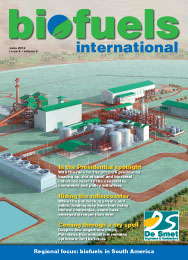
Volume 6, Issue 5
Published: June 22, 2012
Land grab in Africa: no easy way out
The latest coup: Biofuels grab land in Africa. Development NGOs join in the anti-biofuels tune of environmental activists seconded by large food multinationals fearing for their profit margins. Concerned...
US biodiesel spot trade slows in Q2
The economics for biodiesel in the US spot market are already challenging, one in which its cost can be nearly $2 (€1.60) per gallon more than that of petroleum-based diesel. The industry lost a $1...
ILUC stalemate hit during European seed debate
And so the debate rumbles on – European oilseed growers were said to be ‘relieved’ as a recent discussion centred on appropriate consideration of indirect land use (ILUC) changes failed...
No end to US oil addiction?
As the US biodiesel industry still fights for the reinstatement of the $1 (€0.80) per gallon tax incentive, a speech delivered by US President Barack Obama in Albany, New York in May has reiterated...
Coming through a Brazilian dry spell
There have been some trying times for biofuel producers in Brazil recently. Spells of both dry and frosty weather during 2011 has meant sugarcane crop levels, the main feedstock of the country’s...
Argentinean biodiesel: the next generation
The humble castor bean’s stock as a sustainable and cost-effective feedstock for second generation biodiesel production is beginning to rise and South America is in a prime position to take advantage....
Brazilâ
Brazil holds a privileged position in the world as a large producer of biofuels, particularly regarding sugarcane-based ethanol, or first generation biofuel. Although Brazilian ethanol production...
In the presidential spotlight
US President Barack Obama has overseen an extremely active, but volatile four years of biofuels growth, maturation and survival. This political season – as his presidency is challenged – biofuels...
Sweet success
Among the many new crops proposed for biofuels production, the sugar palm is relatively unknown. A recent Ecofys and Winrock study commissioned by NL Agency suggests this crop, native to southeast Asia,...
Cane + grain = continuous ethanol production
Ethanol from sugarcane is one of the most promising biofuels because of its positive energetic balance; growing sugarcane absorbs more carbon than is emitted when the ethanol is burned as fuel. ...
Going beyond carbon
In today’s global economy, non-technical risk management is key to maintaining a licence to operate, as the biofuels industry fully recognises. Having an oversight of the supply chain, beyond...
Added value
Dried Distillers Grains with Solubles (DDGS) is a product of the ethanol production process. The residual corn product leftover after this process (distillers grains) is centrifuged and sold as wet product...
Calculating biomethane GHG emissions
Calculating the greenhouse gas (GHG) impact of biomethane presents a challenge. In this regard, recording all relevant emissions along the production chain and ensuring transparency concerning the GHG...
The evolving biofuels financing environment
The environment for financing biofuels/ biogreentech opportunities has evolved considerably since the deployment of first generation technologies in the mid 2000s. Second generation technologies and the...
Resisting change
There have been a lot of mishaps and setbacks when it comes to getting biofuels into car tanks in European forecourts. Renault promised B30 approval for its diesel line then backtracked; fuel retailer...
Riding the rollercoaster
The biofuel sector has experienced highs and lows with investors over the past decade. After gaining early momentum as a promising alternative to fossil fuels it fell out of favour as the economy collapsed...
Know when to hold â
There are four factors that drive project transition. These are feedstock pricing and availability, operational proficiency, margin management strategy, and available capital. Many biofuel plants...
Making the most of it
Biodiesel emits 85% less CO2 emissions than fossil diesel. While the carbon intensity of mineral diesel is 3,128g/litre of CO2 equivalent, biodiesel produced from waste vegetable oil is 437g/ litre of...












